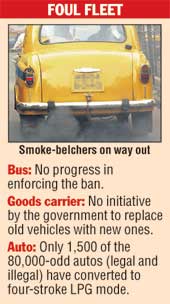 |
A part of the city’s growing fleet of old and polluting commercial vehicles is finally set to go off the road.
The first “concrete” roadmap for the phase-out of taxis more than 15 years old and their replacement with new ones was drawn up on Thursday with the consent of all parties involved — the state government, the vehicle operators and the banks.
Of the 37,000-odd taxis in the Calcutta Metropolitan Area — comprising the city and parts of the adjacent districts — around 7,600 are more than 15 years old. In the Calcutta Municipal Corporation area the tally stands at 6,500.
Motor vehicles director Shankar Pal, who chaired the tripartite meeting, said the “concrete plan” had taken care of all hurdles and urged taxi owners to apply for the replacement at the earliest.
State environment secretary M.L. Meena said: “This is a positive development. We hope other modes of vehicles will follow suit.”
Thursday’s meeting finalised the plan to replace each old taxi with a new one at a cost of Rs 3.96 lakh. The government will pay a subsidy of Rs 20,000, the manufacturer will pay Rs 45,000 for the old vehicle and around Rs 3.22 lakh will come as bank loan. The owner will pay the remaining Rs 9,000.
The taxi operators’ representatives, however, pointed out that the success of the move would hinge on the government ensuring prompt disbursement of bank loans.
The high court had fixed July 31 as the deadline for phase-out of all commercial vehicles more than 15 years old. Precious little has been done to implement the ban on old autorickshaws, buses and goods carriers.
Pal asked representatives of the five taxi associations present at the meeting to keep the deadline in mind while applying for replacement but government sources ruled out any possibility of meeting the July 31 target.
“We want to phase out some vehicles before that date and then approach the court for an extension of the deadline,” said an official in the transport department.
Bimal Guha, the secretary of Bengal Taxi Association, which controls 60 per cent of the taxis, said replacement of all 7,600 vehicles would take at least six months if there was no further delay.
“The government is to blame for the delay. It should report the ground situation to the court and plead for a six-month extension of the deadline,” said Guha.
Probir Das Mahapatra of Progressive Taximen’s Union and Tarak Barik of Calcutta Taxi Association asserted that the move would fall through unless the government ensured that banks disbursed loans fast.
A Union Bank of India representative who attended the meeting said the loan would have to be repaid within five years at an interest rate of 11.25 per cent (approximately).
Under the replacement scheme, an Ambassador taxi could also be exchanged for a Maruti WagonR, Maruti Omni or Tata Indigo. Pradip Jain of RD Motors, the city-based distributor of Tata Motors, said the discount on replacing an old Ambassador with an Indigo would be Rs 50,000.
Regional Transport Authority secretary Ujjwal Sengupta said the government would consider the unions’ demand to waive the temporary registration fee.
Environmentalist Subhas Dutta said the move, if successful, would put pressure on the government to enforce the ban on other polluting vehicles.










